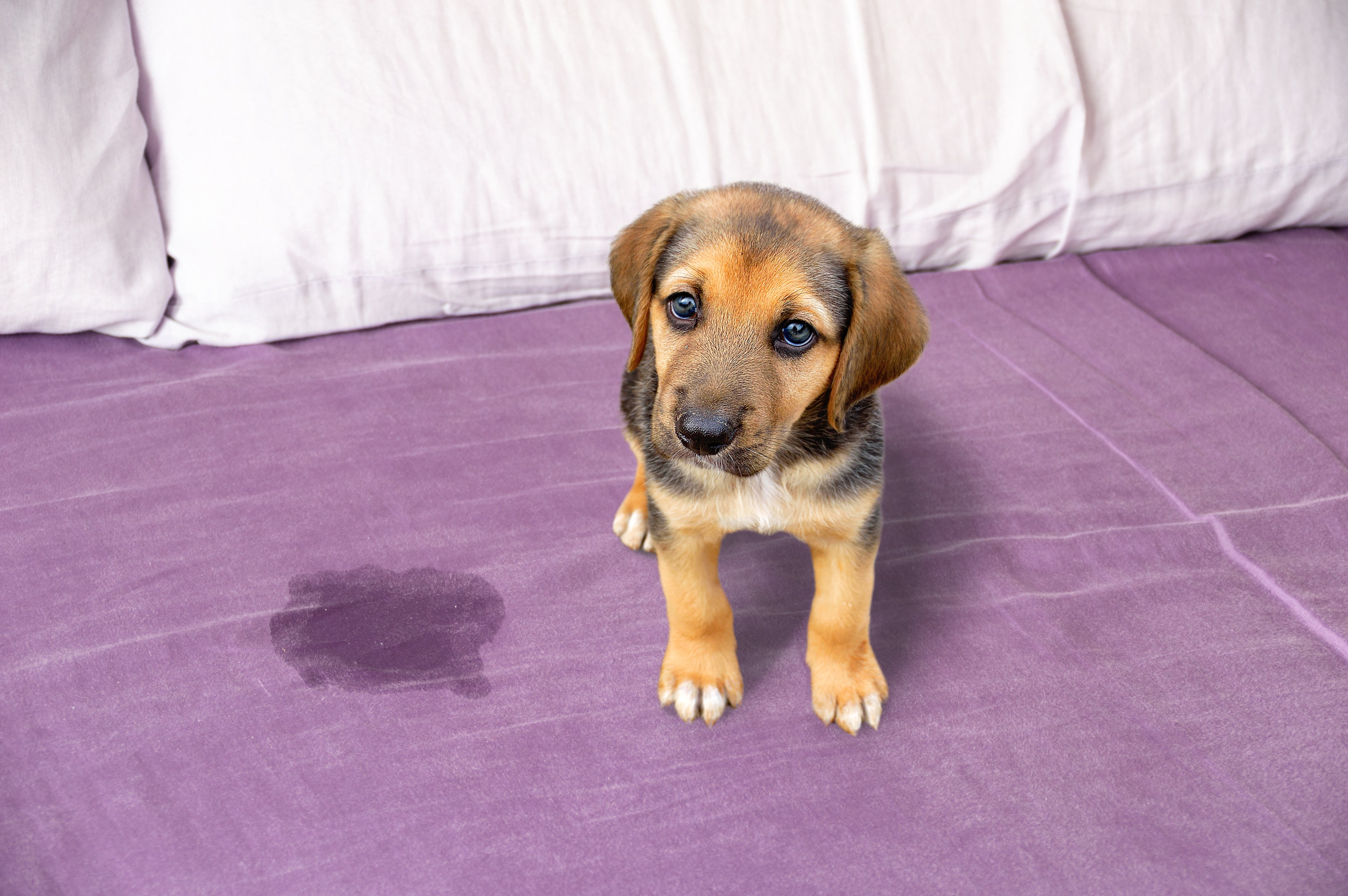Introduction
Figuring out why your dog pees in your bed can be frustrating and confusing, but you should deal with this situation faster to save your bedding and stop accidents from continuing. Once you understand why this is happening - stress, medical, or behavioral issues - you can look into a resolution to better your dog's life as well as your ability to get good sleep.
Understanding Canine Behavior
Natural Instincts
Dogs pee in the bed because of their nature, such as territorial marking and denning behavior derived from their wild ancestors. Marking is one form of claiming territory, and, therefore, dogs tend to view a bed, especially one with the scent of their owner, as ideal territory to mark. Such instincts can be identified by you to redirect your dog towards healthy marking outlets.
Emotional Factors
Anxiety, stress, or even a desire for attention may be one of the causes for the dog to urinate on the bed. Some may use it as a mechanism to deal with stressful events, and others may urinate to attract your attention. Identification of such emotional triggers can sometimes be an important clue to helping the dog feel secure and therefore less likely to have an accident.
Medical Causes
Urinary Tract Issues
UTIs, bladder infections, and bladder stones make the dogs feel an increased urge to urinate, and this can lead to bed-wetting in some cases if they are unable to hold it. In case this happens frequently, take your dog to the vet for a check-up in case common health issues might be causing this behavior.
Hormonal Imbalances
Hormonal imbalances, like spay incontinence in females, or endocrine-related problems can sometimes cause the dog to have accidents in bed due to loss of bladder control. However, most of these health-related accidents can be well taken care of if treated correctly with veterinary assistance.
Age-Related Factors

Puppies learning bladder control and older dogs, who may experience age-related incontinence, can still have an accident from time to time. House training of puppies is very patient and demanding, and elders would require extra support to prevent bed wetting.
Environmental Triggers
Changes in Household Dynamics
Changes such as a new family member, another pet, or even moving to a new house may disrupt your dog's schedule and cause stress, leading to bed-wetting. These changes confuse the animal, and it tends to look for comfort in familiar scents, like those on your bed.
Disruptions in Routine
Feeding schedules, walking routines, or sleep pattern alteration might cause lots of confusion to dogs. Dogs also suffer from a lot of stress due to these changed schedules, resulting in mishaps. For a habit-oriented creature, maintaining routines could reduce anxiety and potentially fewer bed-wetting events.
Training and Behavior
Housebreaking Challenges
Inconsistent potty training is one of the major causes of bedwetting in dogs who haven't been fully housebroken. Without knowing exactly where to go, accidents in the bed are more probable. Patience and persistence, recommitting to their training, will make sure they get over this difficulty.
Submissive Urination
Submissively, some dogs pee out of fear or anxiety. As the dog builds confidence in himself and the relationship with the owner, submissive urination decreases along with bed-wetting incidences.
Psychological Factors
Separation Anxiety
Dogs that cannot stand being away from their owners may pee in bed because they feel separation anxiety. Other symptoms would include whining, pacing or destruction when you are out of the house. With desensitization, soothing routines, and other approaches, a dog's suffering from separation anxiety can also be reduced while minimizing the possibility of puddles on the bed.
Fear and Phobias
Dogs that are afraid of some objects or events, like thunderstorms or past traumatic experiences, may also urinate on the bed due to increased anxiety. Desensitize your dog to such sources of stress or offer your dog a haven, thereby making him feel comfortable enough not to pee on the bed.
Behavioral Solutions

Positive Reinforcement
Reward good habits by giving your dog treats every time your dog goes to the bathroom in the proper area. Do not punish your dog for having an accident, for it may create more anxiety and worsen the problem. Positive reinforcement is a very effective method of encouraging your dog to adopt the right behaviors.
Establishing Boundaries
Train your dog to keep off the bed and provide them with a private space for their cuddly bed. A specific sleeping place reduces the occurrences of accidents on your bed as well as helps in bringing out good behavior.
Medical Interventions
Veterinary Consultation
If this is a recurrent issue, see your vet. Diagnostic tests can diagnose infections, hormonal imbalances, and other issues that might be causing the accidents. Those issues can then be addressed to make both you and your dog more comfortable.
Medication and Therapies
The main cause of bedwetting can either be medical or behavioral and in both cases, they can mostly be treated by medication or therapy. Depending on what the vet thinks is necessary, you will be sent for either treatments or behavior therapy that would help upgrade your dog's quality of life and also minimize bed wetting.
Environmental Adjustments
Creating a Safe Space
Ensure your dog has a quiet place with comfortable bedding, plus some calming aids, like a pheromone diffuser. That should give your dog a calmer space, diminish its instinct to seek comfort on your bed, and reduce the possibility of accidents.
A portable dog playpen like can create a secure and cozy zone for your pup. Whether you place it beside your RV, in your yard, or next to your bed, it helps your dog feel safe and reduces bed-wetting accidents.
Cleaning and Odor Removal
Clean and remove the smell since that is what discourages your dog from returning for re-marking a spot. Make use of pet-friendly cleaners, eliminating odors and stains to repel your dog's return to the same spot.
Preventative Measures
Regular Bathroom Breaks
Take your dog out to its bathroom frequently, especially before bed. Paying attention to signs such as circling or sniffing helps prevent accidents and earns trust. You can also use a playpen as a temporary potty zone during training. It’s especially helpful at night or when you’re camping, ensuring your dog has a clean, defined spot to relieve itself without stress.
Diet and Hydration
It monitors fluid intake, especially at bedtime, which can prevent bedwetting. Properly monitored fluid intake with a well-balanced diet also helps in maintaining a healthy bladder and good bathroom behavior.
When to Seek Professional Help
Dog Trainers and Behaviorists
If this continues, you might need to seek the help of a dog trainer or behaviorist. They can give you tips on how to handle the problem and strengthen your bond with your dog.
Ongoing Support
Other dog owners could also assist you, along with groups of support offering much-needed information and advice. Speaking to others also facing such issues will greatly help in working towards creating an environment that is positive for both of you.
Conclusion

Problems of bedwetting can be solved with patience, understanding, and consistency. Once a root cause is identified and appropriate preventive measures are taken, you can improve the behavior of your dog and strengthen your bond with your dog, making your home comfortable. Creating healthy routines starts with the right environment. A comfortable playpen not only keeps your dog safe but also gives them independence - turning accidents into confidence.
Frequently Asked Questions (FAQ)
Is my dog peeing on my bed out of spite?
No, dogs don't pee on the bed out of spite. Bedwetting usually has an underlying anxiety, medical issue, or incomplete training component to correct.
Can neutering or spaying help reduce this behavior?
Neutering can help calm marking behaviors linked to hormones, particularly in younger dogs. While it doesn't cure all cases, this can help reduce marking propensities and complement other training.
How long does it take to correct this issue?
Correction for bedwetting varies with age, health, and consistency of training. Most cases clear within a few weeks, but sometimes it takes longer because of emotional or medical interference.
Should I restrict my dog’s access to the bedroom?
Reduce access to the bedroom while trying to correct this behavior so that accidental deposits don't happen. A cozy, safe place in your home will help your dog continue to develop good habits.
Are certain breeds more prone to this behavior?
Bed-wetting is not a breed-specific problem. Instead, personality, training, and health are much more individual factors influencing behavior than breed. Emotional and medical solutions will most likely help the problem.


Share:
How to Customize a Playpen for Small Dogs: Tips & Ideas
The Ultimate Guide to Escape-Proof Puppy Playpens